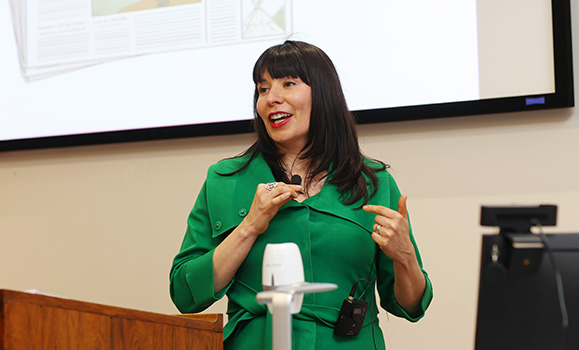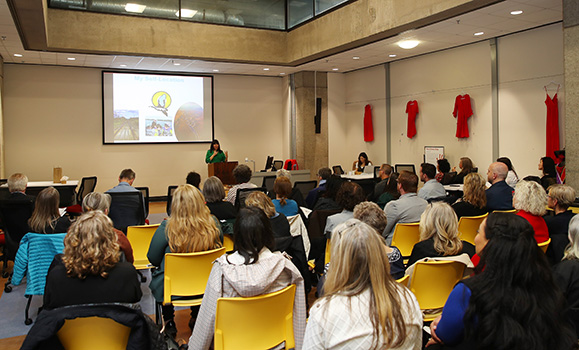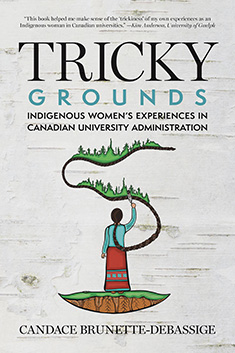The release of the Truth and Reconciliation Commission of Canada's Final Report in 2015 sparked a flurry of activity at universities across the country as they sought to tackle the document’s calls to action.
While a step in the right direction, Indigenous scholar Dr. Candace Brunette-Debassige says this rush to ramp up inclusion efforts has also come at a cost to the Indigenous women so often tasked with leading such work.
“There are lots of stories of struggle," said Dr. Brunette-Debassige during a recent talk and workshop at Dal hosted by the Provost and President’s Offices as part of the university’s preparatory work related to the hiring of an inaugural vice-provost Indigenous relations.
Director of Indigenous Community Relations Catherine Martin and Elder-in-Residence Ann LaBillois welcomed Dr. Brunette-Debassige, Mushkego Cree of Petabeck First Nation in Treaty 9 with mixed Cree and French lineage, to Dalhousie and Mi’kmaq territory with a welcome song.
Dr. Brunette-Debassige's own administrative leadership in Indigenous inclusion work runs deep. She chaired Western University's Indigenous strategic planning committee from 2014-2016, worked as special advisor to the university's provost, and served as acting vice-provost of Indigenous initiatives in 2020 before helping to onboard the person hired in that role.
What she noticed sitting at provincial and national tables centred around Indigenous engagement in post-secondary was just how many of her counterparts at other institutions were also Indigenous women facing similar challenges in their work.
Dr. Brunette-Debassige, who is assistant professor of critical policy, equity and leadership studies at Western, details some of these women’s stories — including some drawn from her own experiences — in her recent book,Tricky Grounds: Indigenous Women's Experiences in Canadian University Administration.
Pushing for change
The findings of Dr. Brunette-Debassige’s study, built around the perspectives of 12 Indigenous women presented anonymously, reveal just how difficult it is to push for change in institutions still infused with colonial culture and structures that perpetuate myths and ideas about Indigenous peoples and Indigenous lands.
“In the study, women talk about being caught in very particular ways. They talked about feeling caught working in this westernized, academic administrative system that has very cemented ways about it and policies and procedures,” she said.
Dr. Brunette-Debassige explained carrying out such complex work in a sector that remains male-dominated has proven quite challenging to many women who fear being labelled a radical, difficult, un-collegial or activist if they push back against colonial structures and systems in their work.
Women interviewed for her study spoke about feeling ill at ease in an administrative context or being labelled as "other" but from within. Some felt stuck on "tricky ground" between the university and Indigenous communities that wouldn’t necessarily see them the same way anymore or assume that they were working for “the other side.”
"It's not as easy as it sounds,” she says, “to create space and open up dialogues around really difficult conversations around Indigenous peoples, our knowledges, and these systems of education."

Building better supports
Now that her book is out, Dr. Brunette-Debassige has been working to raise awareness about it to build better systems of support around this type of work going forward.
Dr. Brunette-Debassige's talk and a facilitated roundtable discussion following it in the Ko’jua Room in the Killam Memorial Library on April 30 provided an opportunity for senior leaders at Dal to learn and ask questions as the university's own search for a vice-provost Indigenous relations gets underway.
Standalone policies are not enough, she said, noting that Indigenous policy should be connected to budget-planning processes with accountability across leadership roles at multiple levels.
"This work should not be placed on one leader's shoulders," she said.
Dr. Brunette-Debassige added that Indigenous leaders must have critical and courageous conversations, sometimes "strategically outside the gaze of the colonizer," while non-Indigenous settlers need to listen and unlearn assumptions and biases rooted in colonial mindsets.

Other measures she recommended included broader representation for Indigenous communities, deeper local engagement with First Nations, reviews of governance structures, and making sure there's adequate funding and structures to support initiatives.
"We can’t make promises and not act on them in good faith and kind any longer. Beyond this multi-layered change, we need to continue and wrestle with upholding the integrity of Indigenous knowledge," she said.
“Sometimes policies, documents and emails are not enough — we need to sit together and share space and laughter. Most importantly, we need to be gentle on these women that stood up and cut the trail.”
Now read
Comments
comments powered by Disqus


